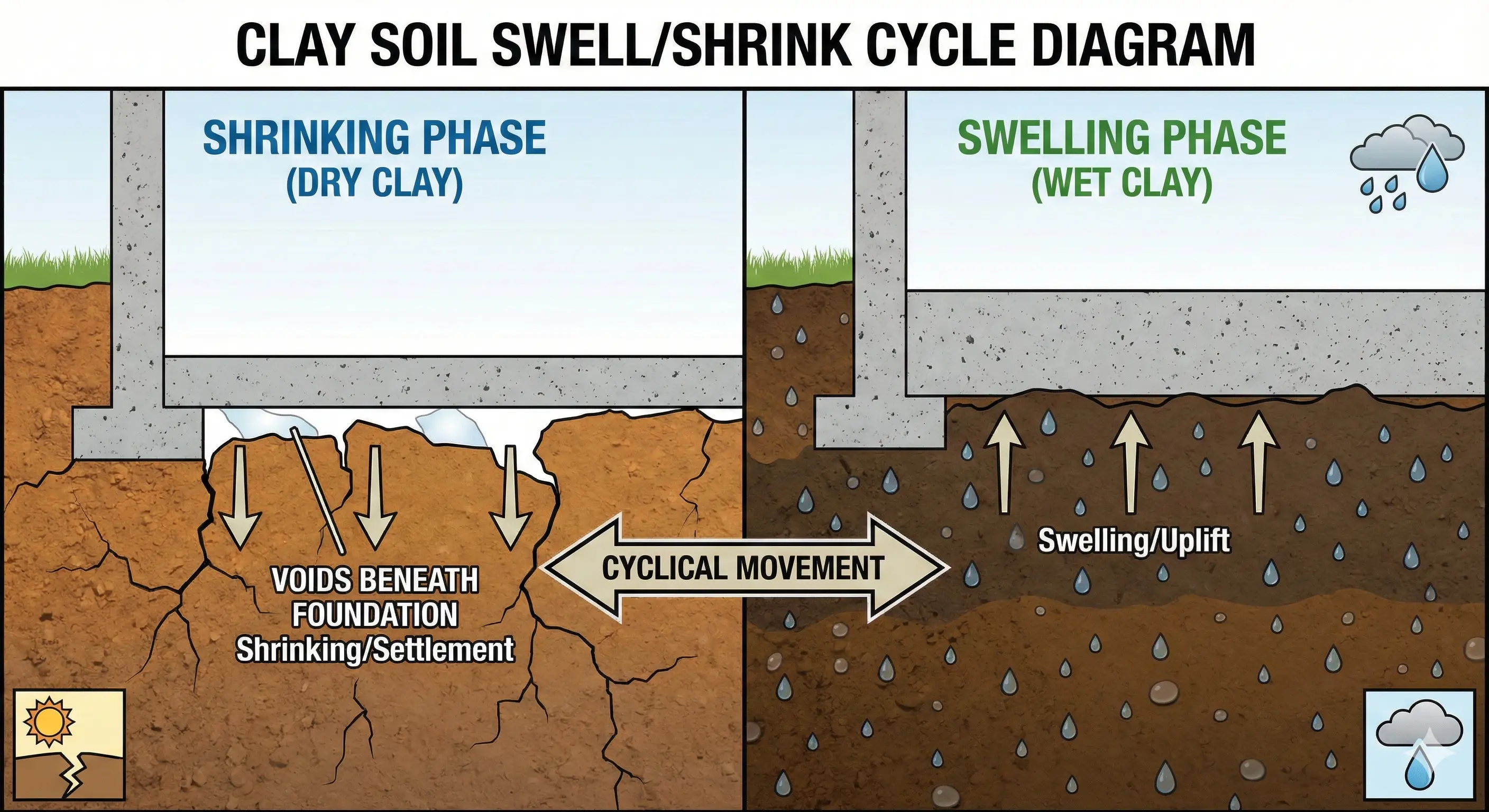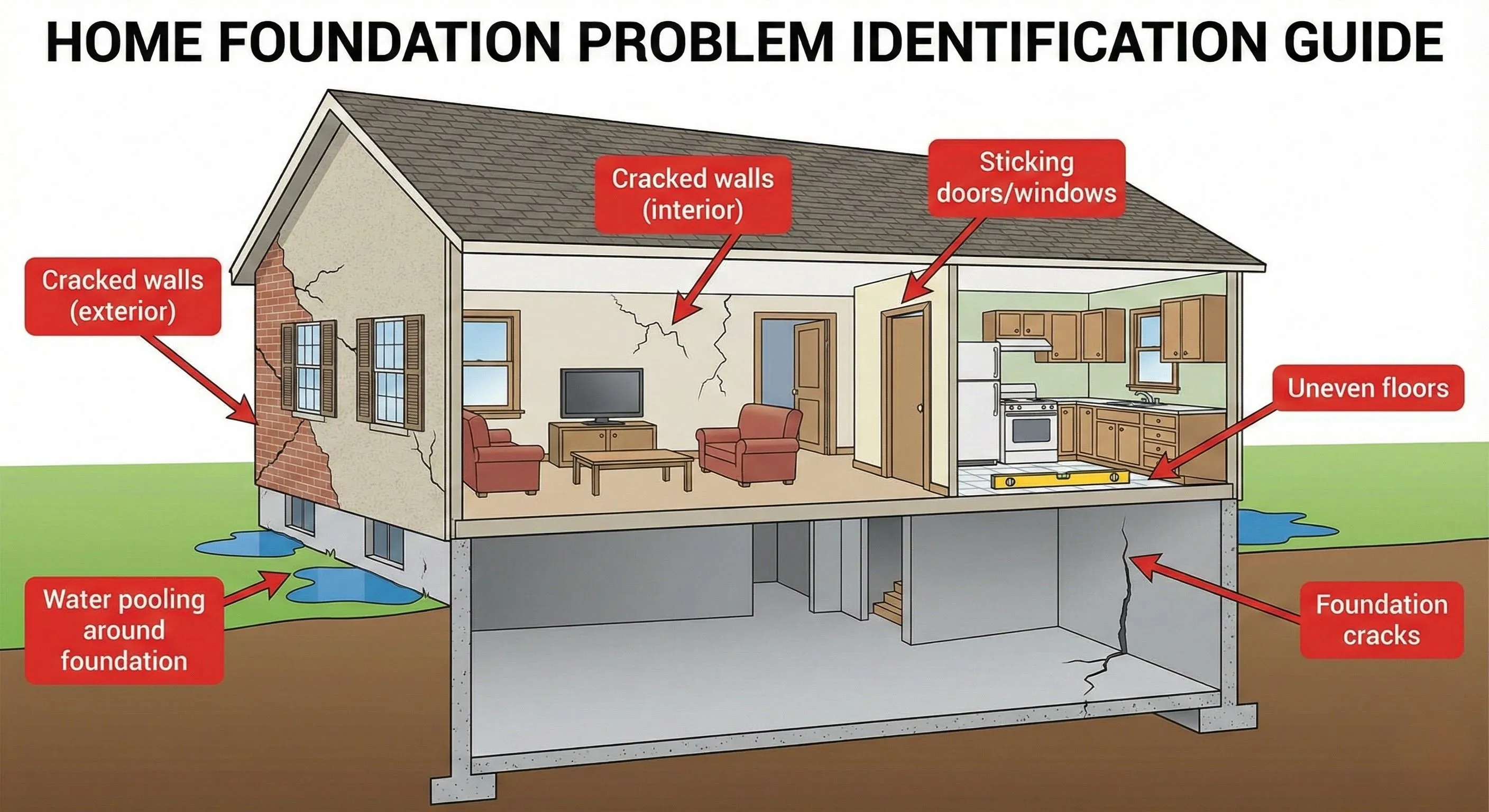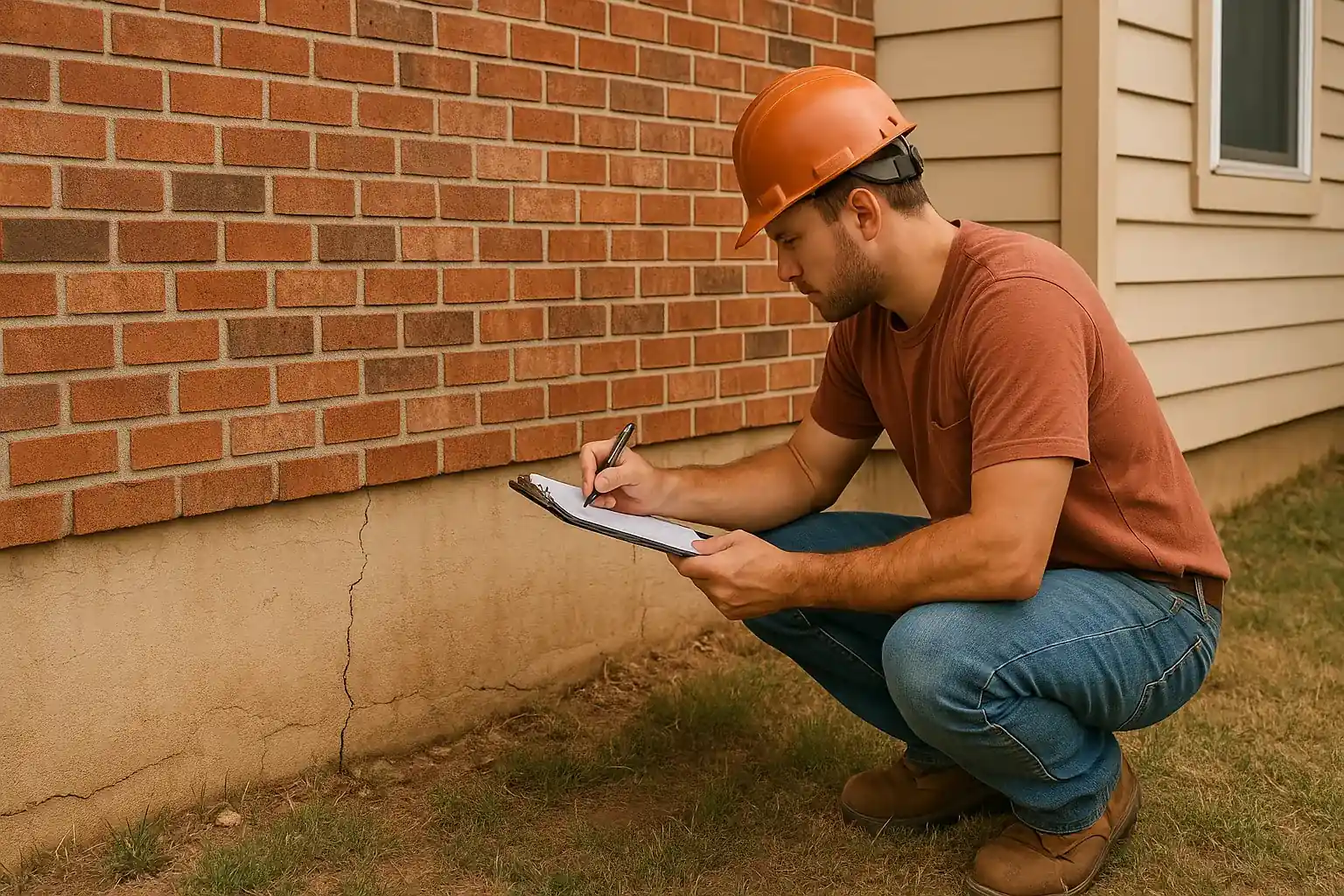Quick Facts About Texas Panhandle Clay Soil:
- Expansive clay is one of the worst soil types for home foundations
- West Texas soil can swell up to 10% when saturated with water
- Clay soil shrinkage during droughts creates foundation stress and cracking
- Most Amarillo homes are built on expansive clay soil
If you own a home in Amarillo or anywhere in the Texas Panhandle, you're likely familiar with the foundation challenges that come with our unique soil conditions. The expansive clay soil prevalent throughout West Texas is notorious for causing foundation problems, and understanding why this happens is the first step toward protecting your home.
Understanding Expansive Clay Soil in the Texas Panhandle
Expansive clay soil, also called "shrink-swell soil," is characterized by its ability to dramatically change volume based on moisture content. When this soil absorbs water, it swells and expands. When it dries out—which happens frequently in our Texas Panhandle climate—it shrinks and contracts. This constant cycle of expansion and contraction puts tremendous stress on your home's foundation.

Why the Texas Panhandle Has Expansive Clay Soil
The geology of West Texas created the perfect conditions for expansive clay formation. Our region's soil contains high concentrations of smectite clay minerals, which have a unique molecular structure that allows them to absorb water like a sponge. According to foundation experts throughout Texas, the Panhandle region has some of the most challenging soil conditions in the state.
The clay content in Texas Panhandle soil can range from 30% to over 60%, making it highly expansive. This isn't just a minor inconvenience—it's a serious concern that affects nearly every homeowner in Amarillo, Canyon, and surrounding areas.
How Expansive Clay Damages Your Foundation
The damage caused by expansive clay soil isn't immediate or obvious. Instead, it's a gradual process that can take months or even years to become noticeable. Here's what happens beneath your Amarillo home:
The Swelling Process
When rain falls or irrigation systems run, water seeps into the clay soil beneath your foundation. The clay minerals absorb this moisture and expand, creating upward pressure on your foundation. This is called "heaving." Different areas of your foundation may experience uneven heaving, depending on where water accumulates and how the soil composition varies across your property.
Foundation experts note that clay soil can increase in volume by 10% or more when fully saturated. For a foundation spanning dozens of feet, this translates to several inches of movement—more than enough to cause structural damage.
The Shrinking Process
The Texas Panhandle experiences hot, dry summers and periodic drought conditions. When soil moisture evaporates, the clay contracts and shrinks away from your foundation. This creates voids or gaps beneath the foundation slab or perimeter beams, leaving portions of your foundation unsupported.
Without proper support, your foundation settles into these voids, causing cracks, shifts, and structural stress. The shrinkage phase is often when homeowners first notice visible signs of foundation problems.
The Cycle Continues
What makes expansive clay so damaging is that this isn't a one-time event. The cycle repeats with every rain event and dry period. Over time, this constant movement weakens your foundation, creating progressively worse damage.
Warning Signs of Clay Soil Foundation Damage
Recognizing foundation problems early can save you thousands of dollars in repair costs. Watch for these common warning signs in your Amarillo home:

Visible Cracks
- Interior wall cracks: Vertical or diagonal cracks in drywall, especially near doors and windows
- Exterior brick cracks: Stair-step cracking in brick veneer or mortar joints
- Foundation cracks: Visible cracks in the concrete foundation itself
- Floor cracks: Cracks in concrete slab floors or tile flooring
Doors and Windows
- Doors that stick, won't close properly, or have gaps when closed
- Windows that are difficult to open or close
- Gaps between door frames and walls
- Doors that swing open or closed on their own
Floor and Structural Issues
- Sloping or uneven floors
- Gaps between walls and floor or walls and ceiling
- Cracks where walls meet the ceiling
- Bouncy or sagging floors
- Separation between walls (especially at corners)
Water and Drainage Problems
- Water pooling near your foundation after rain
- Cracks in your foundation allowing water intrusion
- Increased humidity or moisture in your home
- Mold or mildew growth
Professional Foundation Repair Solutions
If your Amarillo home is experiencing foundation damage from expansive clay soil, professional repair is essential. Here are the most effective solutions used by foundation repair experts in the Texas Panhandle:
Steel Pier Systems
Steel piers are driven deep into the ground—often 20 feet or more—until they reach stable soil or bedrock beneath the expansive clay layer. These piers transfer the weight of your home to this stable layer, effectively bypassing the problematic clay soil.
Steel piers are ideal for the Texas Panhandle because they're not affected by soil movement. Once installed, they provide permanent support that won't shift with moisture changes.
Concrete Pressed Pilings
Pressed concrete pilings work similarly to steel piers but use concrete cylinders instead. These are hydraulically pressed into the soil beneath your foundation until they reach load-bearing strata. They're particularly effective in our West Texas clay soil conditions.
Helical Piers
Helical piers look like large screws and are mechanically screwed into the ground beneath your foundation. They're excellent for lighter structures and can be installed with minimal disruption to your property. The helical design provides excellent load-bearing capacity in clay soils.
Polyurethane Foam Injection (Slab Jacking)
For concrete slab foundations that have settled due to clay soil shrinkage, polyurethane foam injection can lift and level the slab. This process involves injecting expanding foam beneath the slab to fill voids and raise sunken areas. It's less invasive than pier systems but only works for certain types of foundation issues.
Preventing Foundation Damage from Clay Soil
While you can't change the soil beneath your Amarillo home, you can take proactive steps to minimize foundation damage:
Maintain Consistent Soil Moisture
The key to preventing clay soil damage is maintaining relatively consistent moisture levels in the soil around your foundation. Foundation experts throughout Texas recommend installing a soaker hose or drip irrigation system around your foundation's perimeter.
During hot, dry Amarillo summers, run your soaker hose for 15-30 minutes every few days to keep soil moisture consistent. The goal isn't to saturate the soil—it's to prevent extreme drying and shrinkage.
Proper Drainage Management
- Grade your yard: Ensure soil slopes away from your foundation (at least 6 inches of drop over 10 feet)
- Clean gutters: Keep gutters and downspouts clear and functioning properly
- Extend downspouts: Route water at least 5-10 feet away from your foundation
- Install French drains: Consider underground drainage systems if water pooling is a persistent problem
Control Trees and Vegetation
Large trees near your foundation can cause two problems: their roots can physically damage your foundation, and they draw moisture from the soil, causing uneven shrinkage. As a general rule, trees should be planted a distance from your foundation equal to their mature height.
If you already have large trees near your home, maintain consistent watering to prevent them from pulling excessive moisture from foundation soil during droughts.
Regular Foundation Inspections
Schedule annual foundation inspections with a qualified Amarillo foundation repair company. Early detection of minor issues can prevent major repairs down the road. Most foundation companies offer free inspections.
The Cost of Ignoring Clay Soil Foundation Problems
Delaying foundation repairs in the Texas Panhandle can be expensive. What starts as minor settling can escalate into:
- Structural damage: Cracked load-bearing walls, damaged roof structures, and compromised home integrity
- Plumbing problems: Shifting foundations can crack sewer lines and water pipes
- Lower home value: Foundation issues significantly reduce property value and make homes harder to sell
- Higher repair costs: Foundation damage that spreads becomes exponentially more expensive to fix
- Safety concerns: Severe foundation damage can compromise your home's structural safety
Foundation repair costs in Amarillo typically range from $3,500 for minor pier installations to $15,000+ for extensive whole-home leveling. The exact cost depends on the severity of damage, the size of your home, and the repair method required.
Why the Texas Panhandle Climate Makes Clay Soil Worse
Our West Texas climate creates the perfect storm for foundation problems. The Texas Panhandle experiences:
- Low annual rainfall: Amarillo averages about 20 inches of rain per year
- Hot, dry summers: Temperatures regularly exceed 90°F, causing rapid soil moisture evaporation
- Periodic drought conditions: Extended dry periods cause severe clay soil shrinkage
- Sudden heavy rains: When rain does come, it often arrives in heavy bursts that saturate clay soil quickly
- Temperature extremes: Winter freezing and summer heat create additional stress on foundations
This combination of factors means Texas Panhandle homes experience more frequent and severe soil moisture fluctuations than homes in areas with consistent rainfall and moderate temperatures.
Frequently Asked Questions
Is all clay soil in the Texas Panhandle expansive?
Most clay soil in West Texas contains expansive clay minerals, but the degree of expansion varies. The Amarillo area is particularly known for highly expansive clay soil. A soil test can determine the exact expansion potential of your property's soil.
Can I prevent all foundation damage from clay soil?
While you can't completely eliminate the risk, proper maintenance—consistent soil moisture, good drainage, and regular inspections—can significantly reduce the likelihood and severity of foundation problems. Many Amarillo homes with proactive maintenance avoid serious foundation issues.
How do I know if I need foundation repair or just maintenance?
Minor hairline cracks may not require repair, but any crack wider than 1/4 inch, doors/windows that stick, or visible floor slopes warrant a professional inspection. Most foundation companies in Amarillo offer free evaluations to assess whether repair is needed.
Will foundation repair solve my clay soil problems permanently?
Professional foundation repair methods like steel piers provide permanent structural support by bypassing the expansive clay layer. However, you'll still need to maintain proper drainage and soil moisture to prevent new issues in other areas of your foundation.
Does homeowners insurance cover clay soil foundation damage?
Most standard homeowners insurance policies in Texas do not cover foundation damage caused by soil expansion and contraction, as it's considered normal wear and tear. However, some policies offer foundation repair coverage as an add-on. Check your specific policy or ask your insurance agent.
How long does foundation repair take in Amarillo?
Most foundation repair projects in the Texas Panhandle take 1-3 days, depending on the extent of damage and repair method. Pier installation typically takes 1-2 days for an average-sized home, while minor slab jacking can often be completed in a single day.
Should I use a soaker hose year-round?
In the Texas Panhandle, soaker hose use should be adjusted seasonally. Use it most frequently during hot, dry summer months (May-September). Reduce or stop use during wet periods or winter when soil moisture is naturally more consistent. The goal is to prevent extreme drying, not to constantly saturate the soil.
Conclusion
Expansive clay soil is a fact of life in the Texas Panhandle, but it doesn't have to destroy your home's foundation. With proper maintenance, early detection, and professional repair when needed, you can protect your Amarillo home from the damaging effects of shrink-swell soil.
If you've noticed any warning signs of foundation damage—cracks, sticking doors, uneven floors, or water issues—don't wait. Foundation problems only get worse and more expensive over time.
The information in this article is based on research from leading foundation repair experts throughout Texas, including Anchor Foundation Repair, Childers Leveling, Perma Pier, and other industry authorities. Soil characteristics are based on documented geological surveys of the Texas Panhandle region.

